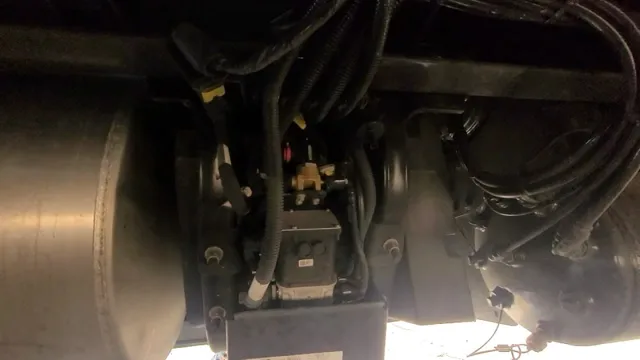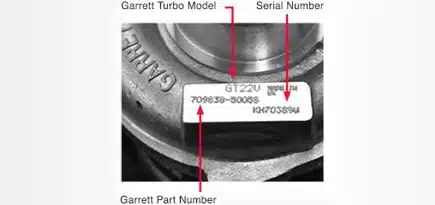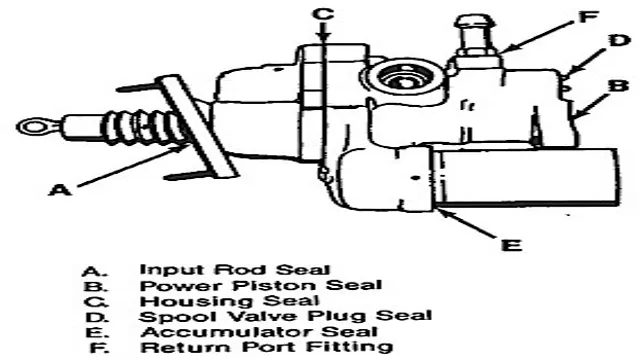Revive Your Diesel Engine: Expert Tips to Fix Poor Quality DEF Fluid
As a vehicle owner, one of your top priorities is to ensure your engine runs smoothly at all times. However, when you start to notice a decrease in performance and a check engine light pops up, it can be a cause for concern. One possible culprit is poor quality DEF fluid, which can negatively impact your engine’s functioning.
But don’t worry, fixing this issue is easier than you might think. In this blog, we’ll explore how to identify poor quality DEF fluid and what steps you can take to resolve the issue and get your engine running at optimal levels once again. So, buckle up and let’s dive in!
Understanding DEF Fluid
Poor quality DEF fluid, also known as diesel exhaust fluid, can cause major issues for vehicles that rely on it to meet emission standards. If you suspect that the DEF fluid you purchased is of poor quality, the best solution is to immediately drain and replace it with a fresh batch. Using poor quality DEF fluid can lead to clogging of the DEF injection system, which can ultimately result in costly repairs or even engine failure.
It’s important to always purchase DEF fluid from reputable dealers and to keep an eye out for any signs of low quality, such as discoloration or a strong odor. By taking proper precautions and addressing any issues with poor quality fluid as soon as possible, you can protect your vehicle’s engine and ensure that it continues to run efficiently.
Components of DEF Fluid
DEF Fluid is a crucial component of modern diesel engine systems, helping to reduce harmful emissions and increase fuel efficiency. Understanding the composition of DEF Fluid can help diesel vehicle owners take better care of their engines and avoid costly repairs. The primary component of DEF Fluid is urea, a non-toxic and water-soluble compound that breaks down into ammonia when heated.
This ammonia then reacts with harmful nitrogen oxides (NOx) in the engine’s exhaust system, converting them into less harmful nitrogen and water vapor. Additionally, DEF Fluid typically includes other additives such as deionized water, ensuring that it is pure and free of impurities that could damage engine components. By keeping the DEF Fluid reservoir topped up and ensuring that it is regularly replenished, diesel vehicle owners can help improve their vehicle’s performance while protecting the environment from harmful emissions.

Common Contaminants in DEF Fluid
DEF fluid is an essential component for diesel engines as it drastically reduces harmful emissions. It’s imperative to understand the common contaminants that can damage the purity of the fluid. One of the most common contaminants is dirt, which can be found in the storage tanks and during transportation.
Water is also a significant contaminant, and even a small amount of water can harm the fluid’s quality. Calcium and magnesium deposits can build up over time and reduce the fluid’s effectiveness. Contamination can cause the SCR system to malfunction, which can result in costly repairs and increased emissions.
It’s crucial to ensure that the DEF fluid is stored, transported, and handled correctly to prevent contamination. Regular testing and quality control measures can help maintain the fluid’s purity and ensure maximum performance. Remember, using contaminated DEF fluid can lead to engine damage and increased emissions, defeating the purpose of using it in the first place.
Signs of Poor Quality DEF Fluid
If you think you might be dealing with poor quality DEF fluid in your vehicle, there are some signs to look out for. One of the most common indicators is a decrease in fuel efficiency. If you start noticing that your vehicle is using more fuel than usual, it could be a sign that your DEF fluid is causing problems.
You may also notice a decrease in engine performance or see warning lights on your dashboard. If any of these symptoms occur, it’s important to take immediate action to fix the issue. One way to do this is to switch to a higher-quality DEF fluid.
By doing so, you can improve your vehicle’s performance and avoid potential long-term damage to its engine.
Effects of Using Poor Quality DEF Fluid
DEF fluid, poor quality DEF fluid, signs of poor quality DEF fluid. Using poor quality DEF fluid can have a significant impact on the performance of your vehicle, particularly diesel engines. Poor quality DEF fluid can lead to various problems that may incur significant costs.
One of the most common signs of poor quality DEF fluid is a warning light on the dashboard of your vehicle. This warning light usually indicates that there is something wrong with the DEF system or the quality of DEF fluid you are using. A fault in the DEF system, caused by poor quality DEF fluid, can result in the vehicle not starting or going into limp mode.
Another sign of poor quality DEF fluid is the development of a strange odor. You should watch out for a strong, pungent smell that signals that the DEF fluid is contaminated with harmful additives or chemicals. Moreover, poor quality DEF fluid can result in the clogging of your engine’s exhaust system, causing harm to the engine.
It can also corrode critical engine components like the fuel lines, tanks, and injectors, resulting in significant repair costs. In conclusion, it’s crucial to use high-quality DEF fluid to avoid the problems mentioned above. Ensure to use certified DEF fluid brands that meet industry standards, and always store the DEF fluid in a clean and dry place to keep it from contaminants.
If you experience any of the signs mentioned above, take your vehicle to the nearest mechanic to get it fixed promptly.
How to Test DEF Fluid
DEF fluid, poor quality, signs of poor quality DEF fluid DEF fluid, short for Diesel Exhaust Fluid, is a crucial liquid that helps reduce harmful emissions in diesel-powered vehicles. However, not all DEF fluids are created equal, as some can be of poor quality and may cause issues in your engine. To avoid these problems, it is essential to know the signs of poor quality DEF fluid and how to test it.
One of the most noticeable signs is the smell. If you notice an ammonia-like smell, it may indicate contaminated or low-quality DEF fluid. Another sign is a change in color, as pure DEF fluid should be clear and colorless.
If the fluid appears cloudy or has a different color, it may be a sign of poor quality. Additionally, poor quality DEF fluid may cause your engine’s performance to drop, and you may notice a reduction in fuel economy. To test DEF fluid, you can use a test strip kit that measures the solution’s urea concentration.
Overall, it is crucial to invest in high-quality DEF fluid to ensure that your diesel engine performs efficiently and reliably.
Fixing Poor Quality DEF Fluid
If you’ve discovered that your DEF fluid quality is not up to par, don’t fret as there are a few methods to revive it. One option is to filter out any particulates using a DEF Filter System. This system utilizes a particle filter and other treatments to separate and remove any contaminants in the DEF fluid.
Another method is to use additives to restore the fluid’s quality since they can improve the performance and purity of the fluid. For example, a common additive is urea, which enhances the fluid’s characteristics. Finally, if the poor quality DEF fluid has been compromised beyond repair, the best course of action is to drain the tank and replace the fluid completely.
Remember to always use a reputable and reliable supplier to ensure top-notch quality DEF fluid. By taking these steps, you won’t have to worry about your DEF fluid impacting your vehicle’s performance.
Draining and Flushing the Tank
Fixing poor quality DEF fluid can be a tricky and time-consuming process, but it’s essential for ensuring that your diesel engine runs efficiently. One crucial step is to drain and flush the tank, which removes any remaining contaminated DEF fluid. To do this, you’ll need to disconnect the hose that connects the tank to the pump and let the fluid drain out.
Once the tank is empty, fill it with water and let it sit for several hours to loosen any remaining residue. Then, drain the water and repeat the process until the tank is thoroughly flushed. This process may need to be repeated several times, depending on the severity of the contamination.
It’s important to use only high-quality, certified DEF fluid to avoid future contamination problems. Investing time and effort into maintaining your DEF fluid quality will save you money in the long run and keep your engine running smoothly.
Cleaning the System Components
If you’re experiencing performance issues with your diesel engine, it could be due to poor quality DEF fluid. Diesel Exhaust Fluid (DEF) is an essential component of modern diesel engines, helping to reduce harmful emissions from the exhaust. However, if the DEF fluid is of a low quality, it can lead to a buildup of contaminants that can clog the system components, causing poor engine performance.
To fix this issue, you can clean the system components thoroughly, which involves removing any remaining DEF fluid and cleaning the system with a specialized cleaning solution. By doing so, you can ensure that your diesel engine operates efficiently and effectively, without the risk of contamination or other issues caused by poor quality DEF fluid. Remember, it’s important to use only high-quality DEF fluid from reputable suppliers to avoid these problems in the first place.
Refilling with High Quality DEF Fluid
High Quality DEF Fluid When it comes to diesel engines, using the right DEF fluid is essential to maintain their performance. Poor quality DEF fluid can cause severe damage to your engine. If you find yourself in a situation where you need to refill your DEF fluid, it’s best to make sure that you’re using high-quality fluid.
Low-quality DEF fluid can lead to harmful contaminants, which can damage your engine’s exhaust system. In addition, using the wrong type of DEF fluid can lead to premature engine wear and tear, which can lead to the need for expensive repairs. So, always make sure that you choose a reputable brand of DEF fluid that is of high quality to protect your engine’s performance and longevity.
Preventing Poor Quality DEF Fluid
If you’re worried about poor quality DEF fluid, don’t worry, you’re not alone. The problem is, poor quality DEF fluid can be detrimental to your engine and can even lead to costly repairs. So what can you do about it? One solution is to ensure you only purchase and use DEF fluid from trusted sources.
Don’t be swayed by lower prices from questionable suppliers; the quality of the DEF fluid could be compromised. In addition, it’s important to properly store and handle the DEF fluid to avoid contamination. Keep it in a cool, dry place and avoid cross-contamination by using dedicated dispensing equipment.
If you’re unsure about the quality of your DEF fluid, it’s always better to err on the side of caution and replace it with a trusted brand. By taking these preventative steps, you can ensure the longevity and efficiency of your engine while avoiding the headache and expense of poor quality DEF fluid.
Proper Storage of DEF Fluid
DEF Fluid, Proper Storage, Preventing Poor Quality Proper storage of DEF fluid is essential for preventing poor quality DEF, which can negatively impact the performance of your diesel engine. DEF fluid is a solution of urea and water, and it is highly vulnerable to contamination, evaporation, and temperature changes. Therefore, it is crucial to handle, store, and transport it with care.
One of the most important rules for proper storage of DEF is to keep it in a clean, dry, and cool location. Ideally, DEF should be stored in a sealed container away from direct sunlight, excessive heat, and sources of contamination such as dust, debris, and chemicals. Additionally, it’s vital to follow the manufacturer’s guidelines for handling and storage of the DEF container.
By preventing contamination and storage issues, you can ensure that the DEF fluid maintains its high quality and purity, thus providing optimal performance and fuel efficiency for your diesel engine.
Regular Maintenance of DEF System Components
Preventing poor quality DEF fluid is an essential aspect of ensuring regular maintenance of DEF system components. DEF fluid is a critical component in diesel engines, and it is responsible for reducing the emissions of nitrogen oxides. However, poor quality DEF fluid can cause significant problems with the efficiency and performance of the DEF system.
Regular maintenance of the DEF system components is crucial to ensure the quality of the DEF fluid. This involves checking the filter, the pump, and the injectors regularly. It is also vital to drain and clean the DEF tank, to eliminate any impurities that can contaminate the fluid.
Additionally, regular testing of the DEF fluid is necessary to ensure its quality and avoid any potential damage to the DEF system components. So, make sure you are vigilant in maintaining the quality of the DEF fluid to ensure your diesel engine runs smoothly and efficiently.
Conclusion
In conclusion, if you’re tired of poor quality DEF ruining your diesel engine’s performance, it’s time to up your game. You could start by investing in a high-quality DEF product or even planting a DEF tree (just kidding). Make sure to use a certified and trusted supplier, keep your DEF tank clean and free from contaminants, and store it properly.
Remember, just like with any fluid, DEF quality matters, and taking care of it will pay dividends in the long run. So don’t be shy, give your diesel engine the love it deserves with great quality DEF, and it’ll thank you with hassle-free performance.”
FAQs
What are the signs of poor quality DEF fluid?
Signs of poor quality DEF fluid include discoloration, a foul smell, and an increase in the level of contaminants.
How do I check the quality of my DEF fluid?
You can check the quality of your DEF fluid using a refractometer, dipstick, or test strips.
Can I dilute poor quality DEF fluid with clean water?
No, diluting poor quality DEF fluid with clean water is not recommended as it can further contaminate the fluid and damage your vehicle’s SCR system.
How often should I replace my DEF fluid?
The frequency of DEF fluid replacement depends on various factors such as vehicle usage and climatic conditions. However, it is recommended to replace DEF fluid every 10,000 to 15,000 miles.






